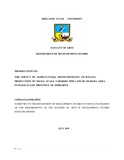Please use this identifier to cite or link to this item:
https://cris.library.msu.ac.zw//handle/11408/4030Full metadata record
| DC Field | Value | Language |
|---|---|---|
| dc.contributor.author | Mandirahwe, Cephas | - |
| dc.date.accessioned | 2020-12-11T11:54:49Z | - |
| dc.date.available | 2020-12-11T11:54:49Z | - |
| dc.date.issued | 2019 | - |
| dc.identifier.uri | http://hdl.handle.net/11408/4030 | - |
| dc.description.abstract | Agricultural biotechnology is gaining momentum in shaping production globally. It ranges from molecular diagnostics, vaccine technology, genetic modification and tissue culture. The study, however, focused on one aspect of agro-biotechnology, that is, the impact of tissue culture in banana plantlets on Banana productivity. The study contributes to the international debate on biotechnology and small scale farming. It argues that agricultural biotechnology, especially the use of tissue cultured banana plantlets has successfully improved small scale banana farming as evidenced by increases in Banana production in Murara area of Mutasa District. The study used both convenience sampling, to carry out interviews with small scale banana producers, and purposive sampling to obtain data from key informants such as extension officers and traditional leaders. The study also used observations and focus group discussions with banana producers so as to comprehend the impact of biotechnology on banana production as well as on farmers’ livelihoods. The study has revealed that the introduction of tissue cultured banana plantlets has phenomenally improved banana farming in Murara area of Mutasa District and by extension, the lives of small scale banana producers. This is seen through increased access to basic needs such as income, health, food, and education. Additionally, it has resulted in women’s empowerment as shown by women’s dominance in banana farming. Since the adoption of agricultural biotechnology, the land under cultivation has expanded and so has banana production. By overcoming the vulnerability of banana farming under traditional ways, the adoption of agricultural biotechnologies has thus promoted the small scale banana production sector. However, the study revealed weaknesses such as lack of value addition to maximize the benefits emanating from biotechnology and thus recommends that this, among other interventions, be also made central in Murara area. | en_US |
| dc.language.iso | en | en_US |
| dc.publisher | Midlands State University | en_US |
| dc.subject | agricultural biotechnology | en_US |
| dc.subject | banana production | en_US |
| dc.subject | small scale farmers | en_US |
| dc.title | Impact of agricultural biotechnology on banana production by small scale farmers: the case Murara area in Manicaland Province of Zimbabwe | en_US |
| dc.type | Thesis | en_US |
| item.fulltext | With Fulltext | - |
| item.languageiso639-1 | en | - |
| item.grantfulltext | open | - |
| item.openairecristype | http://purl.org/coar/resource_type/c_18cf | - |
| item.cerifentitytype | Publications | - |
| item.openairetype | Thesis | - |
| Appears in Collections: | Master Of Arts In Development Studies | |
Files in This Item:
| File | Description | Size | Format | |
|---|---|---|---|---|
| CEPHAS MANDIRAHWE (R125885A).pdf | Full Text | 2.46 MB | Adobe PDF |  View/Open |
Page view(s)
372
checked on Feb 11, 2026
Download(s)
718
checked on Feb 11, 2026
Google ScholarTM
Check
Items in MSUIR are protected by copyright, with all rights reserved, unless otherwise indicated.



